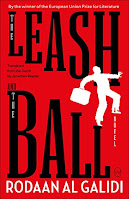Book Review: The Leash and the Ball by Rodaan Al Galidi (translated by Jonathan Reeder)
 |
“My journey began long ago in that tiny village: a journey that I thought was about getting to know the Dutch people, but that I should now confess was really about getting to know myself.”
Samir Karim, an Iraqi immigrant, receives his residence permit after a long wait of “nine years, nine months, one week, and three days” in the asylum seekers’ center (ASC) in The Netherlands. Samir is a university graduate, a qualified civil engineer, having escaped Saddam Hussein’s Iraq to avoid being conscripted into the army. He aspires to travel to Tarifa in the south of Spain but is required to maintain residence for at least five years before he can be issued a passport for onward travel.
His journey as a resident begins in a Dutch village where he shares accommodation with a friend in the shed of the home of the kind Van der Weerdes family. Here he meets Leda, who captures his heart and Diesel, her dog who Samir dubs “a dog and a guru, also a psychologist”. His feeling for Leda and his failed romance deeply impact Samir and Leda’s gift of “a dog leash and a rubber ball” plays a significant role in Samir’s socialization efforts. Samir is fond of collecting photo albums and one of his prized possessions is a garbage bag full of photo albums discarded by strangers. He spends his free time poring over the albums and making up imaginary stories about the people in the pictures. As the narrative progresses we follow Samir’s journey from the village to a monastery, a building housing several students, and an apartment building housing undocumented people and asylum seekers. He encounters people from different walks of life- asylum seekers like himself from different countries who are struggling to find their way in a new land , established immigrants who are well settled some of whom offer to assist newcomers and Dutch nationals - some of whom are sympathetic, some not so much. Racial stereotyping, language and cultural barriers, a general distrust of outsiders and limited employment opportunities are just a few of the challenges Samir has to deal with. He refuses to live on welfare and does not hesitate to pick up any odd job that would enable him to earn an honest living. In describing his experiences as he navigates his way through a new country, culture and language, Samir's tone remains respectful of both cultures- that of his home country and his adopted country. His perspectives on life in the West as compared to the life he has been accustomed to and the resulting culture shock leads to some hilarious and some heartbreaking situations and insights.
“Grief from war, murder, death. Grief from poverty, illness, or injustice. From the loss of a loved one who had disappeared or fled. But never did I see grief completely paralyze a family the way it did the Van der Weerdes.”- Samir’s observation on the death of the Van der Weerdes family’s pet rabbit.
One of Samir’s efforts to engage with Hollanders involves pretending to own a pet dog, walking through the streets with the leash and ball gifted by Leda.
“With a leash in your hand, the Hollanders think you have a dog. Then they think, maybe he’s a Muslim, but a good one, not so hardcore and scary.”
The Leash and the Ball by Rodaan Al Galidi (translated by Jonathan Reeder) is an honest, refreshing take on the socialization process of an immigrant as he acclimatizes to his newly adopted country. With a healthy dose of sardonic humor, the author manages to keeps the tone light and even when alluding to Samir’s nostalgia and homesickness, unhappy memories of war and political unrest in his home country, does so without the narrative becoming too heavy. The prose is simple, the tone is conversational and the style of writing is congruent with the main character as we get to know him through his first-person narrative.
Though the pace of the narrative is on the slower side, Samir’s search for a feeling of belongingness and his efforts to feel at home in a foreign land will touch your heart. In Samir, the author creates a memorable character, one that you sympathize with and respect for his honesty, integrity and indomitable spirit. Overall, this is an entertaining, engaging and insightful novel and I eagerly look forward to reading more of this author’s work in the future.
(Two Blankets, Three Sheets is the prequel to this novel and follows Samir’s journey to The Netherlands and his nine-year wait in the ASC. I would like to point out that this novel is perfectly readable as a standalone novel.)
Many thanks to NetGalley and World Editions for providing a digital review copy of this book in exchange for an honest review. This book is due to be released on September 20, 2022.
Comments
Post a Comment